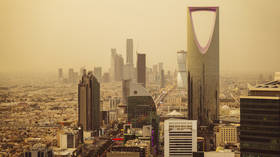Saudi foreign reserves plunge to lowest in 13 years – data

Saudi Arabia’s foreign exchange reserves plunged last month to their lowest level in 13 years, a report published by the Saudi Central Bank (SAMA) on Sunday shows.
According to the figures, the kingdom’s net foreign assets dropped to 1.538 trillion riyals ($410 billion) in April, down by $8.8 billion from March. This represents the fifth consecutive month of declines and the longest streak of drops since early 2019. Reserves are currently down more than 44% since hitting an all-time high at around $737 billion in August 2014, and are at their lowest level since dropping to $418 billion in April 2010.
According to analysts who spoke to Bloomberg, the recent drop in net reserves coincided with a decrease in the government’s injections into reserves.
“The drop in SAMA’s FX reserves came in parallel to a drop in government deposits at SAMA,” Mohamed Abu Basha, head of macroeconomic research at Cairo-based investment bank EFG Hermes, told the news outlet.
Being the globe’s largest oil exporter, Saudi Arabia has traditionally been reliant on the profits it generates from crude sales, and used to deposit a significant portion of that money into its reserve fund. However, last year the government pledged to “decouple” state spending from oil revenues, preferring to keep these funds on its current account until the Finance Committee decides how to allocate them. With crude prices soaring, Saudi oil revenues last year reached a near-record $326 billion, which helped the government run a fiscal surplus – at $27.7 billion – for the first time in nearly a decade.
The government has also set both a floor and a ceiling on reserves as a share of economic output in a bid to protect public finances. According to Finance Minister Mohammed Al-Jadaan, due to the policy change, the government may now decide whether to send its oil earnings into the central bank’s coffers, transfer them to a sovereign wealth fund, or invest in projects intended to help diversify the economy away from oil sales.
Experts note, however, that foreign reserves are important for the country to keep the riyal’s 3.75-per-dollar peg. Nevertheless, with the currency’s 12-month forward outright rate at 3.7505 on Friday, traders currently consider the peg solid.
For more stories on economy & finance visit RT's business section













